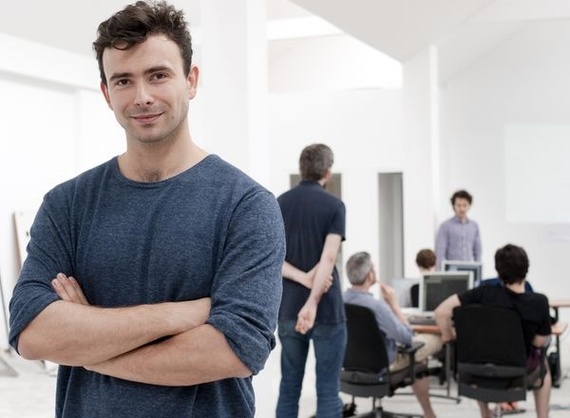Every day, social entrepreneurs from around the world are seizing opportunities others miss to improve broken systems, innovate and develop solutions to change society for the better. Over the past few months, I've traveled to India, Brazil, Southeast Asia, East Africa, Western Europe and the U.S. to visit 50 NGOs and social enterprises with my team at Epic Foundation.
These organizations were selected from more than 1,400 applications we received across 85 countries. They are working hard to enhance education, health, economic empowerment, rights and protection for children and youth around the world.
During my journey, I've had the fortune of meeting a number of ambitious and persistent social entrepreneurs along the way. In this story series, you will hear from some of these indomitable leaders.
Alexandre: What is a great story you can share about one of your beneficiaries?
I think Roxana's path is a very interesting "Simplonian" story.
She came from Romania to Paris, and could not find a job here.When we met her, we felt that she had a very great potential, and she proved it very quickly, even before the start of the training, when she developed a DIY project with a classmate. The project consisted of a website that displayed real-time data collected by a smart object (humidity, temperature, speed, etc.) they built. The device was attached to a garbage container that was moved around the city by a local artist.
At the end of the first training, Roxana set up her own Simplon in Romania, Simplon.ro. Out of the first batch of 15 students, 95% found a job, or set up their own projects. Simplon.ro initiated and trained several hundreds of kids; some have already started using pretty complex programming concepts. Now, Roxana is working on her second batch of training.
Aladine is also another great Simplonian example. During his training, he programmed a web application that solved a problem he knew from real-life experience. He also developed a smartphone app that enables the inhabitants of a low-cost housing district (in the "banlieue" of Paris) to report more easily their housing issues to the housing office.
Alexandre: What was a life changing moment for you?
At age 9, I had this business idea: store keepers could promote their shops to the tourists by posting flyers on boards set up by me and my friends. The storekeepers liked our proposal and paid us. This was kind of my first startup.
Then, we made well written and drawn notices for the homeless (who were often illiterate), and I suppose it was my first step in social business.
What did I learn from my experience? Implementing and testing something fast is the best way to break the cognitive barriers that sometimes prevent the execution of good intuitions. Since then I did not stop doing that, until the day we decided to kickstart Simplon.co with my co-founders Frédéric Bardeau and Andrei Vladescu-Olt.
Alexandre: When you were 15, what did you want to do?
When I was 15, I wanted to be a journalist and a spoken-word artist, so that I could spend time looking for replicable solutions that could be applied to societal and environmental issues, and make them more visible so that people could know and reproduce them.
Later I realized that it had a name, "impact journalism", when I discovered the press agency Reporters d'Espoirs (which became Sparknews since then).
But since then, I realized that I am more comfortable on the project implémentation side.
Alexandre: How do you want people to remember you?
As someone who knows how to empower people and give them the right tools (notably tools that are not accessible, and are becoming more affordable thanks to new tech) to realize themselves and/or their projects.
I also want people to remember me as someone who knew how to give them the right concepts to analyse the world and social systems we are evolving in ("éducation populaire "/"popular education", as we call it in France).
But for the moment, I prefer when people remember the good practices, the methodologies, the techniques, the tools, the mindsets and the constructive ideas I try to pass on to the students of Simplon.co.
Alexandre: What are the three most important things for you to successfully run your organization?
At the very early stage of the venture (ex: when you have the idea but still haven't validated your market), my advice is to bootstrap your company, your association or your NGO as a "lean startup". Be frugal (make the maximum with the minimum of resources), test early, test often, fail fast if you have to fail, meet and know your customers and/or beneficiaries, and read Paul Graham's essays.
Second advice: always try to have a maximum of visibility on your metrics (notably financial and impact metrics), in an expressive and visual way if you can, notably to communicate with your colleagues -- ex: dashboards rather than tables, face to face meetings with post-its and paperboards rather than long emails, etc.
Third advice: be conscious that when your company is growing, one of your most important jobs is to empower your colleagues so that they know how to do your work and replace you, and even to make them better than you are. Make yourself unnecessary, so that the project can go on in any case and so that you can focus on your real added value as a decision maker and/or a visionary founder.

